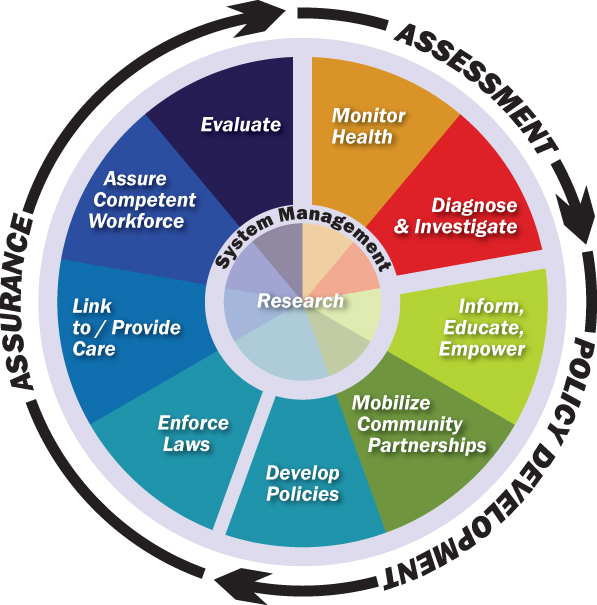Making the world a healthier place
6/16/19 / Matt Herndon

Corona’s clients represent a very diverse cross-section of our communities, ranging from the government agencies that guide us, to the nonprofits that support us, to the businesses that sustain us. Perhaps our most rewarding projects, however, are the opportunities we have to work with people who are working hard every day to make our world a better place. We frequently work with public health departments at various levels of government to help them better understand the needs that their constituents have and how public health can help. But what actually makes public health officials tick? What do they love about the job? And what are some of the ways people get into that world in the first place?
What exactly does Public Health do?
When most people think about their health, they usually think of the doctors and hospitals that we see on a regular basis. However, it’s important to consider that these organizations are trying to help people one at a time. Your primary physician, for example, has very limited ability to influence vaccination policy, for example, a topic that is of particular importance in recent years given declining vaccination rates. Public health, on the other hand, is trying to help people thousands at a time. Between 1900 and 1996, the average life expectancy in the U.S. jumped from 47 years to 78 years, and much of this increase can be attributed to the efforts of public health in areas such as vaccinations, workplace safety, food safety, family planning, declines in tobacco use, and more.

Credit: https://www.cdc.gov/publichealthgateway/publichealthservices/essentialhealthservices.html
The Centers for Disease Control and Prevention lays out the role of public health in a set of Ten Essential Public Health Services. In short, public health focuses on monitoring health issues in the community, developing policies to help improve health, and implementing those policies broadly to ensure that all levels of care are as efficient as possible at addressing those public health needs.
What are some of the jobs that exist in public health, and how do people get there?
When people think of public health, some might think of bureaucrats sitting in offices and making decisions on a whim, but nothing could be further from the truth. People who work in public health come from a wide variety of backgrounds and perform a large range of job roles. Here are a few of the major ones:
- Administration. Yes, like most organizations, public health departments typically need someone to guide the ship, so administration plays a key role in ensuring that everything runs smoothly. Public health officials often grow out of other roles in the broader healthcare landscape, such as healthcare providers (doctors, nurses, etc.) or administrators at other types of healthcare organizations (hospitals, clinics, etc.), though those are certainly not the only paths to such a career. There are also some degree programs that specifically focus on preparing students for careers in public health administration, such as Masters of Public Health degrees.
- Epidemiology. One of the most critical roles of public health is monitoring health issues in the community and trying to understand how public health departments can address those issues. Epidemiologists are at the front line of these efforts, constantly examining the data that we have on medical conditions and making recommendations on how those conditions can be addressed more effectively. While many epidemiologists come from other job roles in healthcare, many have backgrounds in biology or statistics that help them to understand the causes and effects that they see in data. Epidemiologists are critical for informing public policy and driving forward changes that can improve our lives.
- Human Services. When people think of healthcare practitioners, physicians are usually top of mind. But there are tons of people working to provide social services to the community who may not have a medical degree but have just as much of an impact on the overall wellbeing of residents in a community. These professionals focus on working with individuals and/or groups of people in the community to work through difficult situations or to change unhealthy behaviors. This role has perhaps the widest career path to get there, and workers may come from backgrounds ranging from social workers, to therapists, to counselors, and more.
Why do people love working in public health?
The job roles listed above are really just the tip of the iceberg when it comes to the various jobs that make up public health. When it comes down to it, public health officials are driven by a passion for making an impact in their communities. Some people love working with families to help them make better life choices. Some are strongly interested in how our natural environment impacts our health. Some like thinking about how hospitals can more efficiently provide care. Some just love digging through giant datasets to uncover new ways of improving health outcomes broadly. But they all love helping people and have dedicated their lives to doing so.
Regardless of the path they chose to get there, public health is a critical part of our healthcare landscape. They may not get the fame of doctors and nurses who you work with on a one-on-one basis, but they have every bit as much of an impact on our lives.
- Previous Post / Marijuana and Public Health – The Complicated Story of Impact We’re Still Writing
- Understand the People, Understand the Problem. / Next Post
Very good ideas